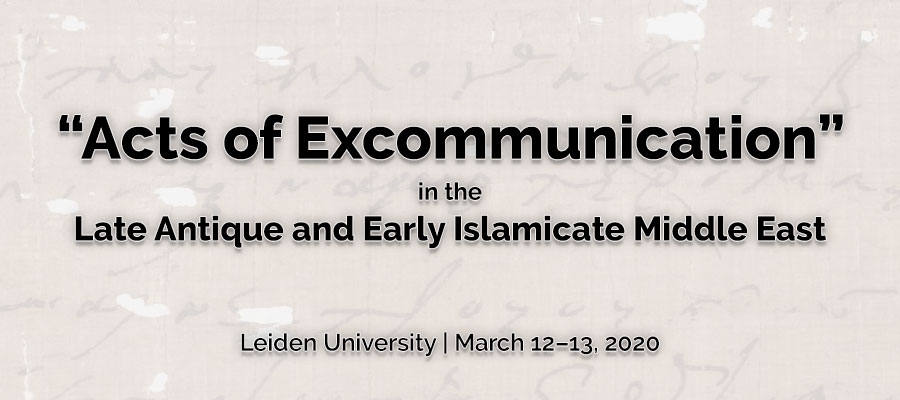“Acts of Excommunication” in the Late Antique and Early Islamicate Middle East, Leiden University, March 12–13, 2020
As part of the ERC-funded project, “Embedding Conquest, Naturalising Muslim Rule (600-1000)”, at Leiden University, this conference aims to bring together both senior and junior scholars to present research which illuminates the dynamics implicit in the act of excommunication and associated practices: ostracism, anathema, and other forms of religio-social exclusion, among the major religious communities of the Islamicate world, 600-1200 CE: including various Christian and Jewish denominations, Sunni, Shiʿi, ‘Khārijī’ and other groups within Islam; Zoroastrians and other relevant groups.
The workshop will focus on “acts of excommunication”, meaning that its primary focus will be specific cases, whether real or imagined, which display the dynamics and implications of excommunicatory practices. The discussion of specifc (pseudo-) documents is particularly encouraged. While participants will be asked to focus on specific cases, they should show how these examples illuminate the larger frameworks within which their cases occurred.
Topics to be covered might include the following:
- Excommunicatory statements in contracts and oaths
- Excommunication as a tool in managing institutional hierarchies and hierocracies
- Maximal and minimalist excommunication
- Exclusions from ritual, social activities, trade, place and space
- Political rebels
- Overlapping or contested jurisdictions
- Enforcement issues
- Excommunication at centre and periphery
- Conversion and apostasy
Aims of the workshop
Scholars of Judaism, Christianity, Zoroastrianism and Islam often study excommunication in separate silos, developing separate vocabularies and models. However, during the early Islamic period, these communities shared space and ideas. When compared, various contexts (theology, ritual, eschatology, social mores) indicate isomorphisms which suggest that different religious communities were as connected as they were divided.
Excommunication is a tool of coercion, and as such, it deserves to be studied in comparative context which might highlight the operation of intersecting power dynamics in society.
This workshop aims to move beyond the idea that acts of excommunication were purely the result of theological issues. Instead, this workshop aims to explore acts of excommunication as social and political as well as religious practice, with important implications for activities in local communities, but also for interactions with wider society and with governing authorities within the early Islamic empire.
While the theological, doctrinal and legal backdrop are important, an act of excommunication does not simply flow from the conceptual force of a doctrinal transgression, but rather it is situated within a set of overlapping fields which may include economic, institutional, familial, political, ethnic, linguistic and generational aspects. These fields, in turn, contributed to how an act of excommunication came to be interpreted and positioned within evolving systems of law, theology and doctrine.
